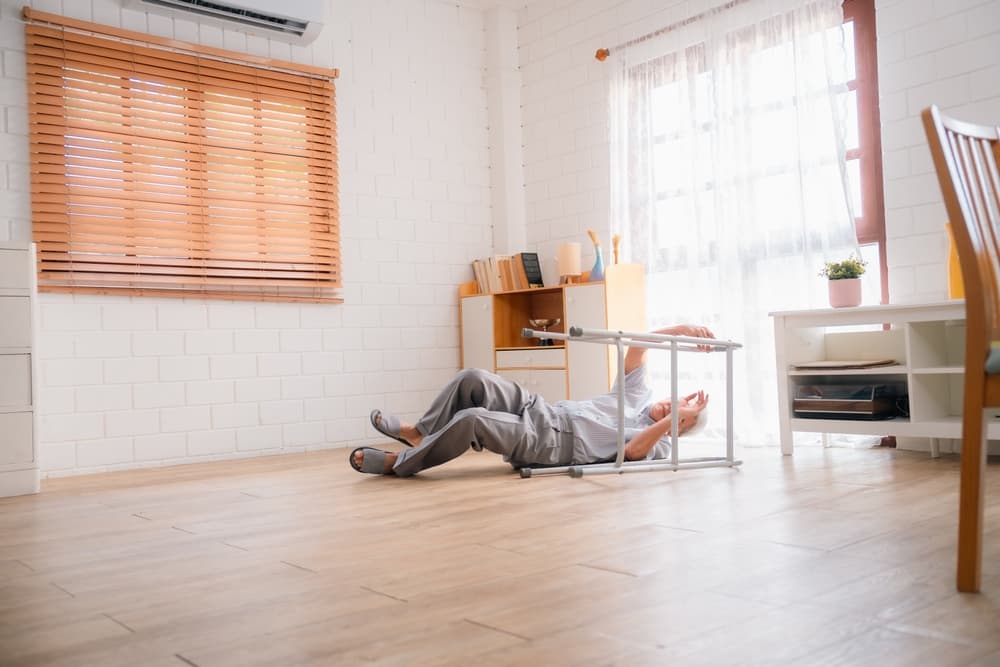What to Do if Your Loved One Falls in a Nursing Home
Gregg Hollander | August 23, 2024 | Nursing Home Abuse

When a loved one is in a nursing home, their safety and well-being should be of utmost importance. Unfortunately, falls can occur due to a variety of factors, such as inadequate supervision, unsafe conditions, or neglectful care. If your loved one falls in a nursing home, you might be wondering what to do.
It’s essential to take immediate action if this happens. The following is a look at the actions you should take to help ensure the victim’s health and protect their legal rights. A West Palm Beach nursing home abuse lawyer will work to serve justice and pursue the compensation you deserve from all negligent parties.
Steps to Take When Your Loved One Falls in a Nursing Home:
Recognize the Signs of Nursing Home Negligence

There are about 1.6 million people living in US nursing homes. A staggering 800,000 of them fall at least once each year. About 500,000 fall at least two times. If your loved one falls in a nursing home, it can indicate even more negligence is occurring. Here are some of the red flags to watch out for.
- Inadequate supervision: There is a lack of staff presence, especially in areas where falls are more likely to occur, such as bathrooms or hallways. When facilities are understaffed, that can leave vulnerable residents without the necessary assistance, increasing the likelihood of accidents.
- Unsafe conditions: Environmental hazards like wet floors, poor lighting, or lack of handrails can increase the risk of falls. Cluttered walkways, loose carpeting, and poorly maintained equipment can also pose significant dangers to residents.
- Neglectful care: Failure to assist residents with mobility issues, providing the necessary medical devices or medications, or properly addressing their individual needs can lead to disaster. Signs of neglect may also include poor personal hygiene of residents, unexplained injuries, or sudden weight loss.
- Poor training or understaffing: Insufficient training and insufficient staff can contribute to an inadequate level of care and supervision. High staff turnover rates can also indicate a problematic environment where caregivers don’t have adequate support or aren’t prepared to handle the demands of their roles.
- Emotional and behavioral changes: Noticeable changes in a resident’s behavior, such as increased anxiety, depression, or withdrawal, can also be indicators of neglect or abuse. Pay attention to how your loved one interacts with the staff and other residents and any reluctance to speak about their experiences.
If you notice any of these signs, please don’t hesitate to address them with the nursing home administration and consider speaking with a nursing home abuse lawyer. Regular visits and open communication with both your loved one and the caregiving staff can help you stay informed about their care and quickly identify any potential issues.
Seek Immediate Medical Attention
If your loved one falls in a nursing home, seeking immediate medical attention is critical. Even if they appear not to be uninjured, internal injuries or complications may not be immediately visible. Here are the steps you should take:
- Assess the situation: Check on your loved one to determine if they’re in pain or distress. If they can’t communicate, look for signs of injury like bruising, swelling, or difficulty moving. Approach them calmly and gently to avoid causing further distress or injury. Ensure they remain still until a medical professional can properly assess them to prevent any additional harm.
- Notify the staff: Inform the nursing home staff immediately about the fall and your loved one’s condition. Insist that a qualified medical professional evaluate your loved one as soon as possible. The staff should take vital signs to determine the severity of any injuries.
- Seek medical help: If the nursing home staff doesn’t take immediate action or you believe the injuries require urgent medical attention, call emergency services or take your loved one to the nearest hospital. Trust your instincts as a family member; you know your loved one’s normal behavior and physical capabilities better than anyone. Don’t hesitate to seek external medical assistance if you feel the nursing home isn’t responding appropriately.
Document the Incident

If your loved one falls in a nursing home, documenting the incident for future reference is essential. This documentation will help support any potential legal actions and ensure a proper investigation can take place. Here are the steps to follow:
- Take photographs: Take pictures of any bruises, cuts, or visible injuries your loved one has sustained due to the fall. Make sure the photographs are clear and well-lit. Capture images from different angles to provide a comprehensive view of the injuries. Also, take photos of the scene where the fall occurred, including any hazards or conditions that may have contributed to the accident.
- Gather witness statements: Speak to anyone who witnessed the fall or has any relevant information about the incident. Ask them to provide their contact information so your nursing home abuse lawyer can obtain written statements detailing what they saw or know. Witnesses can include other residents, staff members, or visitors who were present during the fall.
- Keep medical records and expenses: Keep a file of all medical records related to the fall, including hospital visits, doctor appointments, and any treatments or medications prescribed. Also, keep track of any expenses related to these medical treatments. These expenses should include not only direct medical costs but also any additional expenses such as transportation to medical appointments, medical equipment, or home care services that may be needed due to the injuries.
- Maintain a journal: Keep a detailed journal of your interactions with the nursing home administration, any concerns or issues you have raised, and their responses. This journal will help provide a timeline of events and establish a pattern of negligence if applicable. Include dates, times, and names of the individuals you spoke with, as well as the content of the conversations. This journal can serve as a critical piece of evidence if legal action becomes necessary.
Report the Incident to the Nursing Home
Once you’ve documented the incident, reporting the fall to the nursing home administration is important. Doing so serves as an official notification and puts the facility on notice of the incident. When reporting the incident, make sure to include the following information:
- The date, time, and location of the fall: Provide specific details about when and where the fall occurred. Be as accurate as possible. Include any environmental factors or conditions that may have contributed to the fall, such as wet floors, poor lighting, or obstacles.
- Description of the injuries: Explain the injuries sustained by your loved one due to the fall. Include any medical records or photographs that support your claims. Be thorough in describing the physical and emotional impact of the injuries on your loved one’s daily life and overall well-being.
- Previous concerns or issues raised: If you’ve previously expressed concerns about your loved one’s safety or care, include this information. It helps establish a pattern of negligence and demonstrates that the nursing home was aware of potential risks. Document any previous incidents or complaints you have made and the responses or actions taken by the nursing home staff.
- Request for action: Clearly state that you expect the nursing home to investigate the incident thoroughly, take appropriate action to prevent similar incidents, and provide regular updates on their investigation. Specify any immediate steps you believe they should take to ensure your loved one’s safety and well-being, such as additional supervision or environmental modifications.
Contact a Nursing Home Abuse Lawyer
The next step to take if your loved one falls in a nursing home should be to contact a nursing home lawyer with experience handling nursing home abuse and neglect cases. They can provide you with the necessary legal guidance and support to deal with the complicated process ahead. Here’s why it’s essential to seek legal representation:
- Extensive knowledge in the field: Nursing home lawyers deeply understand the laws and regulations governing nursing home care. They know how to identify and address instances of negligence or abuse effectively. This knowledge allows them to build a strong case that accurately reflects the severity of the situation.
- Investigation and evidence gathering: Your nursing home abuse attorney will thoroughly investigate the incident. They’ll gather evidence, interview witnesses, and consult with experts to build a convincing case for compensation. A skilled lawyer won’t overlook any detail. They’ll also present all evidence in the most compelling manner possible.
- Negotiation and settlement: A nursing home attorney can negotiate with the nursing home or their insurance company to secure a fair settlement for your loved one’s injuries and damages. They’re skilled in negotiating terms that reflect the full extent of the harm suffered and your loved one’s future care needs.
- Court representation: If the case goes to court, your nursing home attorney will provide skilled representation to fight for your loved one’s rights and seek the compensation they deserve. They’ll present your case with experience, supporting all their legal arguments with solid evidence.
- Emotional support: Dealing with your loved one’s fall in a nursing home can be emotionally draining. A nursing home attorney can provide compassionate support and guidance throughout the process, alleviating many of your burdens. They understand the emotional toll such incidents can take and are committed to helping ensure justice and peace of mind.
File a Lawsuit to Seek Compensation

If all attempts at resolving the matter amicably fail, filing a lawsuit against the nursing home may be necessary to seek justice and compensation for your loved one’s injuries and damages. Here are some important factors to consider:
- The statute of limitations: Be aware of the statute of limitations for filing a lawsuit in your state. This is the time limit within which you and your nursing home abuse lawyer must take legal action. If the statute expires, you won’t have any other legal options.
- Evidence: Collect and preserve all the evidence related to the incident, including medical records, photographs, witness statements, and any correspondence with the nursing home.
- Expert witnesses: In some cases, expert witnesses may be needed to testify about the standard of care in nursing homes and whether facility personnel breached that duty in your loved one’s case.
- Legal representation: Work closely with your nursing home lawyer to prepare and file the lawsuit. They’ll guide you through the legal process, filing all necessary paperwork correctly and meeting all designated deadlines.
What Types of Compensation Can You Pursue?
If your loved one has fallen in a nursing home due to negligence, they may be entitled to various types of compensation. Here are some of the potential types of compensation your nursing home abuse lawyer can seek:
- Medical expenses: This includes the cost of medical treatments, hospital stays, doctor visits, medications, and any ongoing care or rehabilitation needed after the fall.
- Pain and suffering: Your attorney may also seek compensation for the physical and emotional pain your loved one experienced.
- Loss of enjoyment of life: If the fall has resulted in a loss of independence or decreased quality of life, your loved one may be entitled to compensation for these losses.
- Punitive damages: In cases of gross negligence or willful misconduct by the nursing home, punitive damages may be awarded to punish the facility and deter similar behavior in the future. However, it’s essential to note that courts rarely award punitive damages.
Your nursing home abuse lawyer will assess the damages and build a strong case to seek the compensation your loved one deserves under the law.
Contact an Attorney Near You

The situation can be overwhelming and emotionally challenging if a loved one falls in a nursing home. Seeking legal advice and representation from a personal injury attorney is vital to protecting your loved one’s rights. It’s also critical to see that those responsible for your loved one’s suffering face justice.
Speak with a nursing home abuse attorney who has experience in these cases to guide you through this difficult process. They’ll provide support and fight for the compensation your loved one is entitled to. You don’t have to face this alone; help is just a phone call away, so don’t delay.
